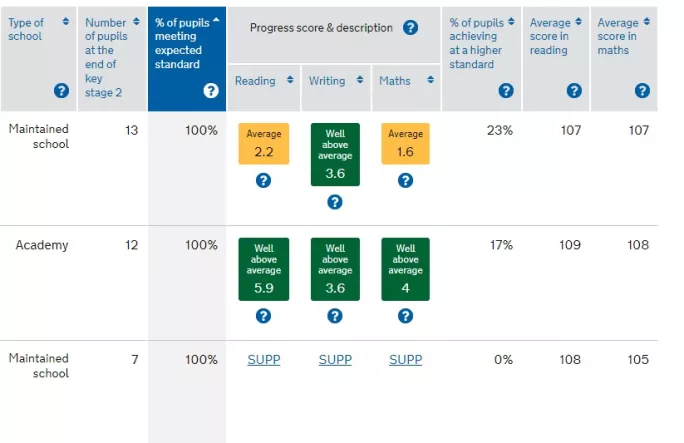This year’s GCSE league tables put schools in a quandary

What’s in a name?
For Juliet it was a question about the sweet smell of roses - but for those in education, the same question could apply to league tables after the Department for Education said it will rename the Compare School and College Performance (CSCP) website to try and dissuade comparisons between schools based on this year’s exam outcomes and other performance data.
This change comes after criticism earlier this year that schools were “being thrown to the wolves” by the government decision to publish GCSE league tables this summer, despite the huge and uneven disruption to learning caused by the pandemic.
Pepe Di’Iasio, president of the Association of School and College Leaders (ASCL), said in March: “How can it be right to compare the performance of one school or college with another when they have been so differently affected by the pandemic over the last two years?”
At the time the DfE said it would ensure that any data published would carry messages advising “caution when considering the 2021-22 data”, including discouraging users of the data from drawing comparisons with performance data from previous years.
However, Steve Rollett, deputy chief executive of the Confederation of School Trusts, said he felt this would be unlikely to achieve much. “All the caveats in the world will struggle to strike this note of caution if data is published, as usual, on a website called ‘Comparing School Performance’,” he wrote on Tes.
GCSE league tables under a different name
This concern over the name of the website seems to have resonated, with the DfE’s new Secondary accountability measures - update guidance stating that the CSCP website will be renamed as part of a raft of measures designed to avoid unfair data comparisons.
“To support appropriate use of the 2021-22 data, we plan to make changes to the performance measures website and the way we present school and college level data for 2021-22,” the guidance says.
“We will be carrying out further work and testing over the coming months on these changes for this year, which will include […] changing the name of the website to reduce the emphasis on comparison between institutions.”
What this new name will be remains to be seen, though, as the DfE had not replied to a Tes request for this information at the time of publication.
For now, then, we can only guess that this new site might be called: Don’tcomparetheschoolsmarket.com perhaps?
The DfE has also said it will remove the All schools and colleges in England comparison tables - although it said that local authority and national averages for each performance measure will still be shown and available to download.
Furthermore, it said that it would stop using “coloured ‘bandings’ (see the image below) to highlight schools above the average, as a way to “discourage simplistic conclusions being drawn about a school or college’s overall performance”.

The sector, however, has not been very impressed with these precautionary measures, with a groundswell of opinion that it would have been better to simply not publish the data at all.
As Tes reported on Wednesday, Geoff Barton, general secretary of the ASCL, said the decision to publish the tables at all - despite the changes - was “hugely disappointing” and it would be “simpler and fairer” to simply suspend the tables for another year.
Rollett told Tes that he had a similar view. ”A legitimate argument could be made that performance tables should not have been published at all this year,” he said, although he added that the changes made were “welcome”.
Caroline Derbyshire, chair of the Headteachers’ Roundtable and executive headteacher and chief executive of Saffron Academy Trust, was more forthright, saying that the changes were purely ”cosmetic”.
“The data is still there for all to see. A braver and more ethical approach would have been to refuse to publish at all,” she said.
Di’Iasio, who is also the headteacher of Wales High School in Rotherham, told Tes that the changes had some merit - but he still questioned the wisdom of publishing performance data, given the upheaval of the past two years.
“I cannot deny that I am pleased the education secretary has listened to feedback from across the profession. At a time when we are just beginning to recover from the most turbulent and traumatic periods of teaching, it would be a real kick in the teeth to then have unfair and deeply flawed comparisons made between schools,” he said.
”[However] I would still much rather see a suspension to the performance tables for a further year to allow the system some time to settle and for a full and thorough evaluation to take place before we agree what data should be published, in what format, in future years.”
One school leader told Tes that the data will not represent exam outcomes but pandemic experiences.
”[The data will be] more representative of how many families had wi-fi and full device access throughout the pandemic; how many could feed their families; how many schools had the staff, resources, infrastructure to provide high-quality remote learning; how many families suffered terrible tragedy at some point or even multiple points during the pandemic that changed their lives forever,” they said.
Ethical quandaries ahead
But the plan is in motion so the data will be published.
This will, no doubt, mean that some schools want to celebrate their data and outcomes as usual while others that have done less well than they would have liked - for all the reasons mentioned above - will want to keep quiet and focus on the year ahead.
This could create tension in the sector, with Derbyshire saying that, ideally, schools will focus instead on celebrating individual successes rather than whole-school achievements. ”Ethical schools will only celebrate the achievements of individuals this summer,” she added.
That’s an interesting gauntlet to throw down. Di’Iasio agreed that he would try and focus on individual stories rather than school-wide achievements.
“I feel that it would be totally appropriate to recognise the hard work and endeavours of our students,” he told Tes.
“However, I guess where I would draw the line this year would be at not quoting statistics that involve unfair and flawed comparisons with other years or schools - that would seem totally inappropriate.”
Julie McCulloch, director of policy at the ASCL, said that although it is not in the organisation’s remit to tell schools “how they should celebrate exam success”, it is important that everyone is aware that there is potential for the data to be used in a way that is unfair to some schools.
“It is important that everyone involved in education is cautious about the potential for the publication of data to lead to comparisons being drawn between schools which have been very differently affected by the pandemic,” she said, adding that this underlines once again why the data being published is so unhelpful.
However, one leader said that, given that many schools will certainly promote their outcomes, it will force the hand of others anyway. ”Ethical schools may sadly have to promote their data if data is published,” they said.
“They will be forced to because other schools will, and the community will ask or go online and find the published data and question why the school hasn’t promoted.”
As such, it may well be that, come August, whatever name the DfE has given to its school performance website, there will be the same intensive focus on league tables and outcomes.
Dan Worth is senior editor at Tes
You need a Tes subscription to read this article
Subscribe now to read this article and get other subscriber-only content:
- Unlimited access to all Tes magazine content
- Exclusive subscriber-only stories
- Award-winning email newsletters
Already a subscriber? Log in
You need a subscription to read this article
Subscribe now to read this article and get other subscriber-only content, including:
- Unlimited access to all Tes magazine content
- Exclusive subscriber-only stories
- Award-winning email newsletters
topics in this article



